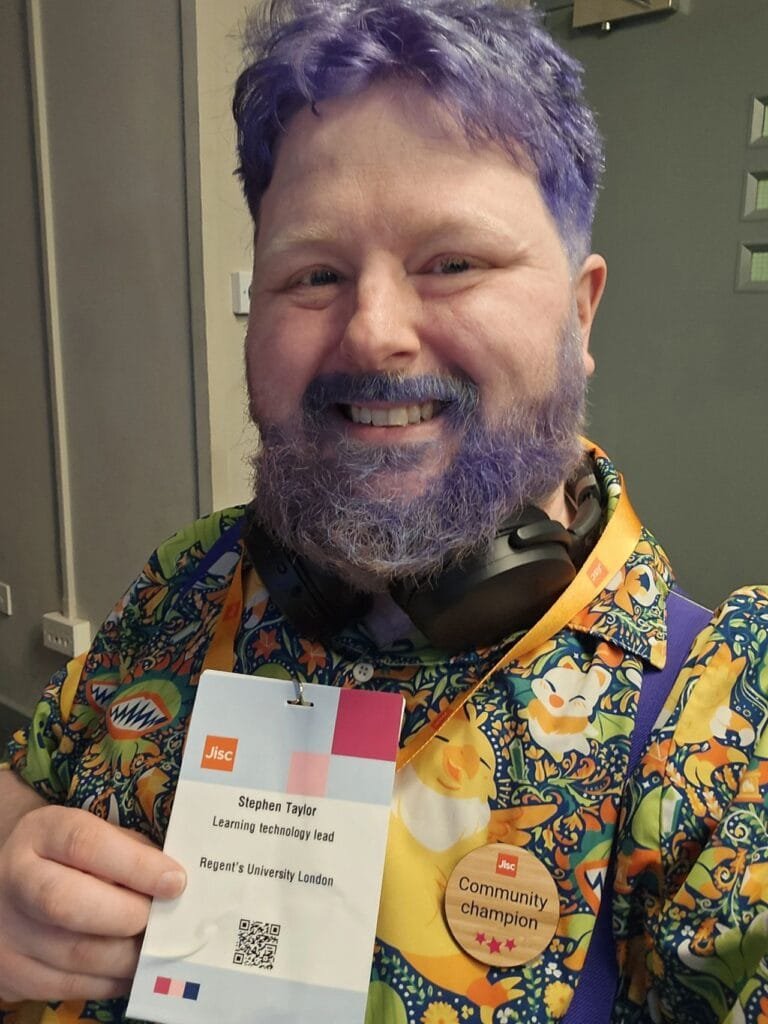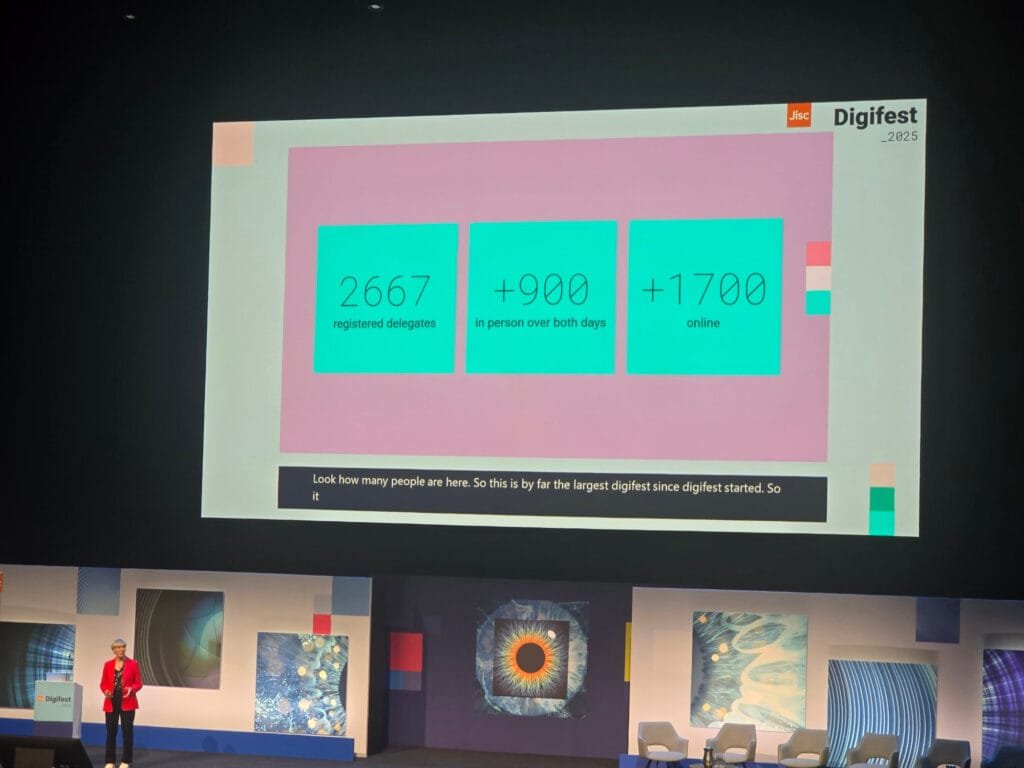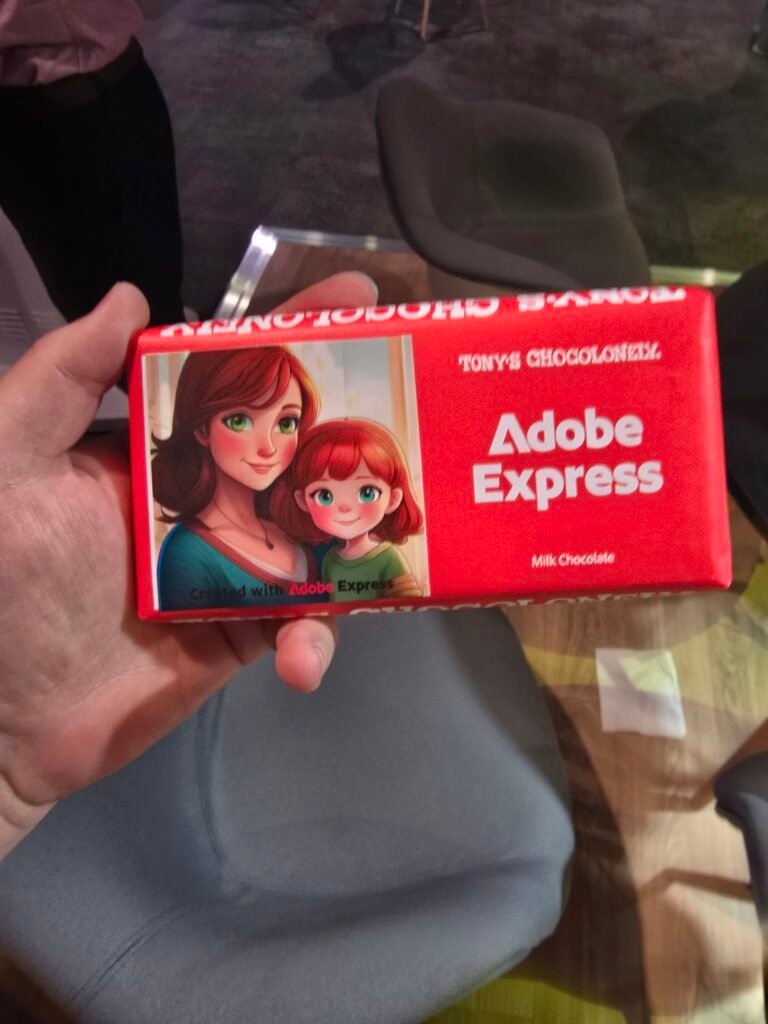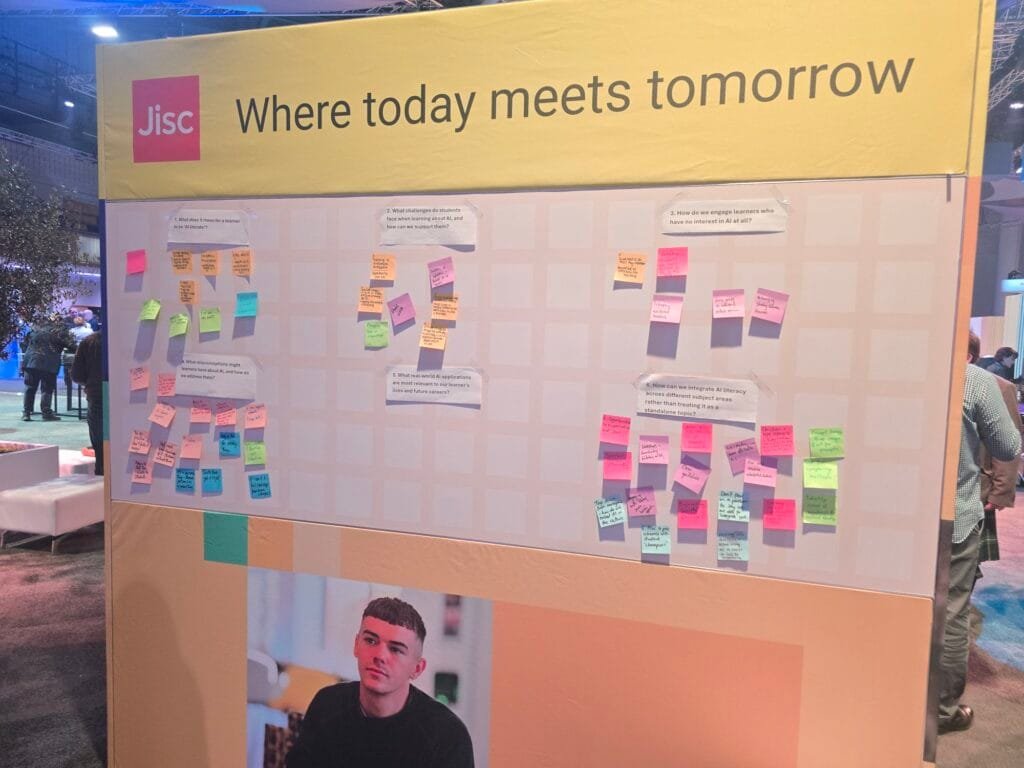
This week (w/c 10th March 2025) was my favourite conference for personal CPD (continuing professional development) – Jisc’s Digifest. Its an annual 2 day event where UK Further and Higher Education staff involved in the use of educational technology come together for talks on innovative pedagogical uses of technology, exploring issues of note to the sector, meeting companies who provide great resources and, most important of all, networking with hundreds of educators who are also keen on embracing digital pedagogy!

Community Tech Guru

I am highly honoured to have been nominated for, and to have received the Community Tech Guru award for 2025 as part of Jisc’s Community Champions initiative! This was recognised at Digifest and I had a meal with the other champions, old and new, on the Tuesday night, as well as joining discussions around communities and talking on the Jisc podcast about them.
Where today meets tomorrow
The tagline for the event was Where Today Meets Tomorrow, with the focus on how we continue to innovate safely and effectively in a rapidly changing world. The intro video sums up the role of digital leaders in education currently:
Brilliant Failures
I only actually attended 2 main sessions over the course of the 2 days. I knew they would be recorded so spent the rest of the time networking and talking to people. The first keynote was amazing, Paul Iske spoke to us about embracing failure. Its so important that we do that, especially with our tech and our pedagogy. Fail often and fast, so that we don’t do huge failures long term, and make sure we learn from things and improve the service as we go, bringing others along with us.
I made a lot of posts about it on Bluesky as it was live :
Accessibility Session
I also went to the accessibility one, where we identified that the biggest need aroud accessibility is to train others in it, change cultures so using the accessibility checker isn;t an after-thought but is seen as a key step in any and all content creation by all staff and students.
There are also new laws coming in that will affect the sector as a whole:
The European Accessibility Act (EAA)
This law coming into force means any outlying resistance from departments to adopting basic web accessibility standards ( usually because they are the commercial and marketing side rather than directly involved in education), will disappear. It brings the same rules into force for any commercial product and advertising as are in place for public content that may be seen by Europeans, which includes many of our students. This isnt something that will be fully enforced for a few years, but change needs to start now.
The Online Safety Act
This relatively new law covers any user to user communication methods. That includes Teams chats, Blackboard messaging, blackboard discussions, padlets, wooclaps…anything with a messaging component. It is the responsibility of the organisation providing access to the service to ensure no illegal activities or content are shared upon them. This means there will need to be much heightened visibility and moderation from what we are currently used to.
Networking
The rest of the event was me networking, networking and networking!
Jisc Discovery Tool
Had some great chats with the people behind the Jisc discovery tool, and we are collectively excited to start exploring it at my organisation.
British Esports Federation

The British Esports education team were there. I played a few rounds of rocket league very poorly! Their focus is on getting esports leagues set up between colleges and between universities. But also in providing the esports qualifications and foundation degrees – Esports is an industry with mega, mega money in it, so it could prove rather beneficial for universities.
Communities

There was a lot of talk around communities, given my community champion role. It coincides nicely with a message I got from some educators at my organisation about wanting a community of those of us who are keen to innovate with tech. So, I’m setting up a Regent’s Tech Champions community as a formalised place for those who are keen to all be together sharing ideas and bouncing them off each other.
Turnitin concerns
Many people were bemused by Turnitins new feature where they expect students to write all their essay within a turnitin hosted space called ‘Clarity‘. That way they claim theycan ensure theres no AI cheating. Which is a load of rubbish. The general consensus was it feels like a desperate gasp to save the dying style of assessment.
Adobe Education

Adobe were a huge presence and actually sponsored Digifest 25. They were running a lot of things with WonkHE, all focused around digital pedagogy and creativity. It was very refreshing to see the company not just trying to sell its product (they did have that, of course), but that actually seemed interested in ensuring education as a whole improved.
AI in Education

I spoke with Jisc AI in education team at length about all sorts of things. Especially ethics, how to share AI safely with staff/students and how to market what AI is and isnt. Paul Iske in the brilliant failures had a gretat thing for it that AI isnt artificial intelligence, its additional intelligence. Its not there to replace our intelligence, its there to supplement and give us ideas to jump off of as a starter for 10.
Playful Learning Association
I made some connections with people leading the Playful Learning Association. It’d be great if I can make it to the Playful Learning Conference this year. So much of what they work on coincides and resonates with the aspects of pedagogy I am passionate about.
Data Maturity and HESA Data Futures
I spoke at length with the data team at Jisc, talking primarily about their Data Maturity Framework and discussing ways to get educators and senior leaders to want to actively engage with it. How its all about exploring concepts that those making decisions don’t know they don’t know.
I also had a great discussion with the head of HESA Data Futures, they werent prepared for just how disparate and disjointed data retrieval is across the sector. Nor for the sheer quantity of data they received. Because there hasnt previously been any formalised, regulated way to do it everything has been done slightly differently by each institution. It’s made it hard to compare data as it stands, and made it difficult for even small institutions to gather the required data in the format needed.
Digital Strategy
There was a lot of talk about the importance of a cohesive digital strategy within organisations. Without that its too easy to get lost in the woods and pursue initiatives and software that will only have minimal impact, rather than what our staff and students actually need. I must admit it was very nice to be validated on that.
Digital/Data Storytelling
I did some sessions on digital/data storytelling and why its so important. That tied well into the focus of my masters dissertation, as well as the work I am doing around using digital boardgames to aid education. Being able to craft a narrative and a story, having fun experiences to share about learning is how we get people to understand things, and crucially remember them!
Raw data or highly technical explanations will do nothing for those who aren’t already fully invested and understanding of what is being covered, theres a place for it sure, but it shouldnt be the default. The default should be explaining it in ways anyone can understand, so all can follow along with what yoiu are saying, then go into the depth once you know everyone is on the same page.
Student Wellbeing – Toxic Masculinity
There was quite a lot of talk about the issues around toxic masculinity and people like Andrew Tate. How do we combat that as organisations through our wellbeing channels? How do we identify alternative positive role models and actually get students listening to them instead of the manosphere.
In Summary

And there were so many other things as well, I probably spoke to around 300 different people over the 2 days. Its very validating being able to share ideas with likeminded people and seeing the same struggles are repeated industry wide.
I look forward to being back again in 2026!
